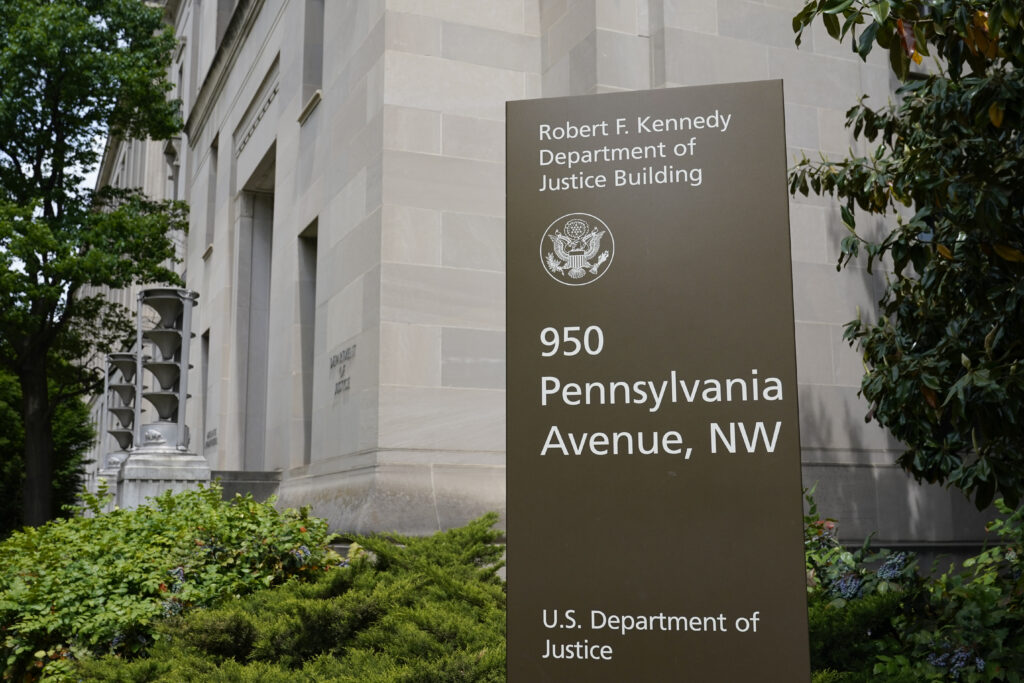Judge Denies GOP Missouri Officials’ Bid to Block DOJ Election Monitors

A federal judge denied an attempt from Missouri Attorney General Andrew Bailey and Secretary of State Jay Ashcroft to block the Department of Justice (DOJ) from monitoring polling places in St. Louis on Election Day.
The Republican state officials lost their bid Monday for a temporary restraining order against the DOJ, which the plaintiffs argued were violating Missouri law that allows only “certain categories of persons” to be present at voting locations.
The DOJ announced on Friday that it would deploy monitors to 86 jurisdictions in 27 states, including Missouri, on Nov. 5 to ensure that election officials are complying with federal voting rights laws.
In Monday’s order, District Court Judge Sarah Pitlyk, a Trump appointee, found that the public’s interest in the enforcement of federal voting rights laws outweighs the public’s interest in the enforcement of Missouri’s election laws. “The Court finds that the State of Missouri has not carried the burden of justifying extraordinary relief,” the order said.
The DOJ faced a similar challenge from Texas over its plan to monitor polling locations in eight Texas counties. Texas Attorney General Ken Paxton (R) sued the DOJ “for dispatching federal agents to ‘monitor’ Texas elections without any legal authority and in violation of State law,” authorities announced Monday.
On the same day the Texas lawsuit was filed, both parties reached an agreement. DOJ election monitors will remain outside of polling and central count locations and must follow Texas law, which prohibits electioneering within 100 feet of polling locations.
Read more about the case here.
Previous update, Nov. 4
Missouri Attorney General Andrew Bailey (R) and Secretary of State Jay Ashcroft (R) sued the U.S. Department of Justice (DOJ) on Monday to block them from monitoring polling places in St. Louis on Election Day.
On Friday, the DOJ announced that it would deploy monitors to 86 jurisdictions in 27 states on Nov. 5 to ensure that election officials are complying with federal voting rights laws. One of the jurisdictions is Missouri’s capital.
The DOJ monitored polling places in 27 different states on Election Day in 2022 as well, including in Cole County, Missouri. Ashcroft sent a letter to the department saying that its actions violated Missouri law, and the DOJ decided not to send personnel to the state.
Now, with the 2024 election only one day away, Bailey and Ashcroft filed a lawsuit against the DOJ and U.S. Attorney General Merrick Garland specifically.
“For the second election cycle in a row, the Department of Justice, at the 11th hour, has announced an intent to displace state election authorities,” the Republican officials said in the lawsuit. “As they did in 2022, they have refused to specifically identify any federal law that they believe authorizes their actions.”
Bailey and Ashcroft claimed that Missouri law only allows certain individuals to be present at voting sites, including voters, poll workers and election judges, but not the federal officials the DOJ plans to send.
“No one is above the law,” Ashcroft said in a statement. “The law clearly and specifically limits who may be in polling places and this action by the DOJ is not allowed. Once again the federal government is attempting to illegally interfere in Missouri’s elections.”
They also argued that the DOJ’s actions violated the federal Administrative Procedures Act because the department exceeded its authority.
Bailey and Ashcroft asked a federal district court to declare the DOJ’s actions illegal and both temporarily and permanently block the department from deploying election monitors to polling places in Missouri.
In September 2022, Missouri passed an extensive voter suppression law, which implemented many measures, like a strict photo ID requirement for voters and a prohibition on the use of certain electronic voting machines. The law has faced multiple lawsuits since its passage.
If a court blocks the DOJ from deploying personnel to St. Louis on Tuesday, they won’t be able to monitor officials to ensure they don’t violate the Voting Rights Act, the Help America Vote Act, the Americans with Disabilities Act and other federal laws.